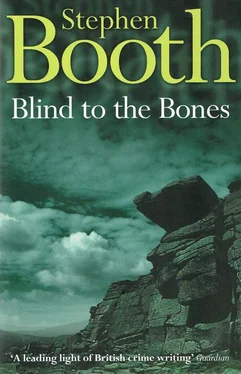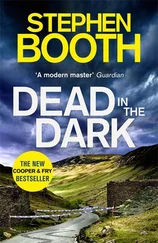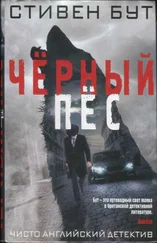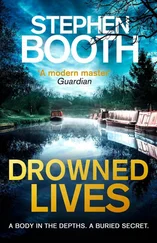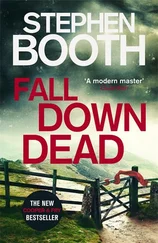‘Well, stick at it. Try a different approach.’
‘Yes, sir.’
Cooper could feel DCI Kessen’s eyes on him, and decided to keep quiet. A transfer to the Rural Crime Team might come quicker than he expected, if he wasn’t careful.
‘Unfortunately, we’re still waiting for any useful forensic results from the scene. The lab has promised us something shortly.’
There were a few muffled groans. That probably meant that evidence taken from the crime scene had gone to the Forensic Science Service at the cheap rate, so it would take longer to be worked on by the lab. The police had to pay for the services of the FSS per item, so there were budget considerations to take into account. Promises, on the other hand, didn’t cost anything.
‘However, if we can line up a few prime suspects, we’re hopeful there will be some contact traces we can use to tie them in to the scene, both the air shaft and the lay-by where Granger’s car was parked. The enquiry team tracing lorry drivers who used the A628 that night is having some success.’
‘So what’s the theory?’ said Cooper, forgetting that he had decided to keep quiet. ‘That Neil Granger was a member of a gang of antiques thieves operating in the area?’
‘It seems the likeliest explanation for the presence of the bronze bust in his car. It was part of the haul from Southwoods Grange. It’s possible the members of the gang fell out over the proceeds. It happens all the time. Maybe Granger had been trying to keep some items for himself, and the others found out.’
‘Why do you think they would meet at that particular spot?’
‘It’s quiet enough. And the access is reasonably easy, especially if the rest of the team had a four-wheel-drive vehicle and drove up to the air shaft.’
‘It wasn’t particularly convenient for Neil Granger. He left his car in the lay-by, and walked up.’
‘We don’t know that he walked up. He may have been in someone else’s vehicle.’
‘True.’
‘At the scene, we’re intending to do a search of the surrounding area, but it’s mostly heather and bare peat — not much scope for hiding anything.’
‘And what about the air shaft?’ said Cooper.
‘What about it?’
‘There may be no scope for hiding anything in the heather, but what about inside the shaft?’
‘It’s too high to reach,’ said Hitchens doubtfully.
‘If there was a vehicle here, they might have had a ladder. An aluminium stepladder in the back of an estate car or something. You could do it easily. In fact, if you piled some of these loose stones on top of each other, I reckon one person could give another a leg up, and they could get over the edge.’
‘I’ll make a note,’ said Hitchens. ‘And we’ll let the task force do it. They have ladders.’
‘Was there anything in Neil Granger’s house?’
‘Nothing that has been recognized as an antique, anyway. Not unless you count a set of plaster ducks on the wall in the spare bedroom.’
‘Hey, those fetch quite a bit now,’ said Murfin. ‘I saw some at an antiques fair the other day. I couldn’t believe the price. But the guy on the stall said they were kitsch, and most people had chucked them away when they went out of fashion. So they have a rarity value, if they’re genuine.’
‘But would you think of nicking them if you broke into somewhere full of proper antiques, Murfin?’
‘Probably not.’
‘And would you then hang them on the wall in your spare bedroom, with the grottiest wallpaper you could find?’
‘No.’
‘All right. So there were no other items that looked like stolen antiques. A team is going through all the addresses and phone numbers they could find in the property, but Granger wasn’t very organized, I’m afraid. And none of the names match any of the suspects on the Rural Crime Team’s list of possibles.’
‘He’d have to be more than disorganized to leave a list of his criminal associates lying around for us to find,’ said Cooper.
‘Stranger things happen. Stupider criminals have been known.’
‘This one wasn’t stupid, sir. He hasn’t been making many mistakes.’
‘Apart from the one that got him killed.’
‘What about this black make-up business?’ said Murfin.
‘OK, it’s an unusual form of disguise, but the make-up seems to have been conveniently at hand because of some theatrical group he was involved in rehearsals for.’ Hitchens looked around the room. ‘Anything else we haven’t covered?’
Diane Fry began to stir slightly on her chair near the front.
‘Oh, yes, we haven’t forgotten the possibility of a link to the disappearance of Emma Renshaw, who still hasn’t been found,’ said Hitchens.
It didn’t sound convincing to Cooper, and Fry didn’t look happy about it. There was a definite air of after-thought. But to his surprise, DCI Kessen seemed to latch on to the subject.
‘DS Fry, did you want to explore that a bit?’
‘Thank you, sir.’ Fry took a moment to gather her thoughts. Maybe she was equally surprised at being asked for her opinion. ‘I do think we should bear in mind that Neil Granger was supposed to have been the last person to see Emma Renshaw before she disappeared. But we only ever had his word for that.’
Hitchens slipped naturally into the role of devil’s advocate.
‘Yes. But bear in mind that he didn’t have time between leaving the house and arriving at work to do anything much more than drop Emma off somewhere,’ he said. ‘If he didn’t drop her at the railway station, where did he take her? And why should he lie about it?’
‘It’s also true that we only have Neil Granger’s word for the time he left the house.’
‘But again, there was only a few minutes’ margin there. Alex Dearden left no more than ten minutes before Granger says he did. So the most we could allow him would be, say, twenty minutes.’
‘That’s time to do quite a lot,’ said Fry stubbornly.
‘To kill Emma and dispose of her body? I don’t think so.’
‘If he killed her in the house, her body could have been in the boot of his car while he was at work.’
‘Was his car forensically examined at the time?’ asked Kessen.
‘No, sir.’
‘That’s a pity. A wasted opportunity. It would at least have eliminated that possibility. Did he have the same car as the one we have in our possession now?’
‘I’m not sure, sir. I think so.’
‘If Emma Renshaw’s body was ever in the boot of his car, Forensics may still be able to get some traces. Bloodstains perhaps, or fibres. You could get that checked out at least, Fry.’
‘What about Alex Dearden?’ said Hitchens.
Fry shook her head. ‘I don’t see how he had time to do anything. Neil Granger saw him leave. And Granger admitted to being the last to see Emma.’
‘There’s always the possibility that they were in this together.’
Kessen looked at Fry apologetically. ‘I’d be more open to that kind of suggestion if you could offer me a motive. One of the boys, yes — an attempted rape, a rejected sexual advance, or something of the kind. We’ve seen it often enough. But two of them conspiring together? Were they particularly friendly?’
‘No, sir.’
‘So why should Dearden help out Granger, or vice versa?’
Even Diane Fry was silent at that.
‘Of course, Emma Renshaw might have decided she couldn’t afford a taxi,’ said Hitchens. ‘She might have set off to walk to the station, or to catch a bus, or hitch a lift.’
‘No one along the route to the station reported seeing her,’ said Fry. ‘In any case, it’s over four miles and she was carrying a bag. Bus drivers didn’t remember her, and no motorist ever came forward to report giving her a lift, or seeing her hitching.’
Читать дальше
Конец ознакомительного отрывка
Купить книгу
